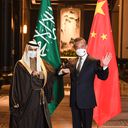China hosts string of Gulf officials in sign of growing influence

The foreign ministers of Saudi Arabia, Kuwait, Oman and Bahrain and the secretary-general of the Gulf Cooperation Council are all visiting China this week for talks on boosting trade and security cooperation.
Why it matters: The flurry of visits by Gulf officials is part of China’s push for deeper involvement in the Middle East. For Beijing, the Gulf in particular is key to its energy supply and increasingly to its geopolitical influence.
With Washington focusing on the Indo-Pacific, and with U.S.-Saudi relations under strain, there is a perception among Gulf leaders that the U.S. is slowly but surely pulling out of the region. Some U.S. officials are concerned about the degree to which China seems to be moving in.
- A $23 billion deal for the U.S. to sell F-35 fighter jets to the UAE has stalled in part over U.S. concerns that China could get access to sensitive U.S. military technology.
- Last December, CNN reported that U.S. intelligence agencies assessed that Saudi Arabia is actively manufacturing ballistic missiles with the help of China.
- And last November, the Wall Street Journal reported that the Biden administration was concerned that China was secretly building a military facility at a port in the UAE.
Driving the news: On Monday, Saudi Foreign Minister Faisal bin Farhan met his Chinese counterpart Wang Yi in the city of Wuxi in eastern China.
- They discussed the bilateral relationship and regional issues like Iran, Yemen and Afghanistan, according to the official readouts.
- Both sides described the relationship as strategic and expressed readiness to boost it. They also announced that a joint high-level committee would convene to enhance cooperation.
What they're saying: Wang said both countries oppose "unilateralism and bullying," while Prince Faisal said his country opposes “interfering in China's domestic affairs” and supports China's position on Taiwan, on the Uyghurs in Xinjiang, and on human rights, according to the Chinese readout.
The other side: A senior U.S. State Department official tried to downplay the significance of the Gulf officials' visits, stressing that each country has a sovereign right to make decisions based on its own interests and that the U.S. remains committed to its partnerships in the Gulf.
- "We recognize that our allies and partners in the region have complex relationships with China, which will not always align with our own," the official told Axios.
- "Our focus has been on closing the gaps in areas like technology and infrastructure, which we have seen China exploit to exert coercive pressure. We will rely on innovation and competition in these areas."
What's next: Iranian Foreign Minister Hossein Amir-Abdollahian is expected to travel to China in the coming days. Iran's Foreign Ministry said the sides would discuss the 25-year cooperation agreement they signed last year.